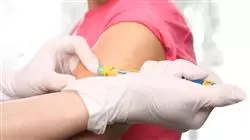University certificate
The world's largest faculty of medicine”
Introduction to the Program
Acquire among your professional competences the specialization in Obesity and Diabetes, a unique opportunity to help your patients to control their diet and prevent certain diseases"

Obesity is a health problem that affects people all over the world, although it has a higher incidence in more developed countries, largely due to the lifestyle of citizens and the ability to acquire higher calorie foods. Even so, the World Health Organization (WHO) estimates that it may affect 650 million subjects worldwide, with a related mortality of about 2.8 million subjects per year.
The increase in its incidence, the accompanying comorbidities that lead to a significant increase in mortality, especially cardiovascular and cancer mortality, the various medical and surgical treatments available, together with the exponential increase in health care costs it entails, have made obesity a permanent focus of attention.
With this in mind, preventing obesity is essential. Through the use of a multidisciplinary approach, the aim is to implement lifestyle changes, especially physical activity and dietary patterns, and should be introduced as early on in the process as possible. Thus, health education has become essential to prevent situations of obesity.
However, it is also necessary to take into account that obesity can lead to the appearance of other associated diseases, which can cause serious damage to people's health. In this case, with this Advanced master’s degree we want to focus on Diabetes, since it is a complex and chronic process that requires a comprehensive approach by the physician, which goes beyond glycemic control. In fact, type 2 diabetes is the most widespread form of this disease in adult patients, with overweight and obesity as risk factors. Therefore, a healthy lifestyle can prevent their appearance.
This Advanced master’s degree offers the possibility of deepening and updating knowledge in this area, with the use of the latest educational technology. It offers a global vision of Obesity and Diabetes, while focusing on the most important and innovative aspects to prevent and treat these diseases. All this in a 100% online specialization, which will allow you to expand your knowledge and, therefore, your professional skills and competencies in a simple way, adapting your study time to the rest of your daily obligations.
This program has been designed for professionals seeking the highest qualification, with the best didactic material, working on real clinical cases and learning from the best professionals in the sector"
This Advanced master’s degree in Obesity and Diabetes contains the most complete and up to date scientific program on the market. The most salient features of the specialization are:
- The development of clinical cases presented by experts in Obesity and Diabetes.
- The graphic, schematic, and eminently practical contents with which they are created, provide scientific and practical information on the disciplines that are essential for professional practice.
- Diagnostic and therapeutic novelties on Obesity and Diabetes
- The presentation of hands-on workshops on procedures, diagnostic and therapeutic techniques
- Real images in high resolution and practical exercises where the self-evaluation process can be carried out to improve learning.
- An algorithm-based interactive learning system for decision-making in the clinical situations presented throughout the course.
- Special emphasis on evidence-based medicine and research methodologies
- Theoretical lessons, questions to the expert, forums for discussion of controversial issues and individual reflection papers.
- The availability of access to content from any fixed or portable device with an Internet connection.
This program has been designed for professionals seeking the highest qualification, with the best didactic material, working on real clinical cases and learning from the best professionals in the sector"
Its teaching staff includes health professionals from the medical field, who contribute their work experience to this specialization, as well as renowned specialists from leading scientific societies.
Its multimedia content, developed with the latest educational technology, will allow the professional a situated and contextual learning, that is, a simulated environment that will provide an immersive learning programmed to train in real situations.
The design of this program focuses on Problem-Based Learning, by means of which the physician must try to solve the different professional practice situations that arise throughout the specialization. For this, the professional will be assisted by an innovative interactive video system developed by recognized experts in the field of Obesity and Diabetes, with extensive teaching experience.
Increase your confidence in decision making by updating your knowledge through this Grand Master, a program created to train the best"

We offer you the best teaching methodology, with a multitude of practical contents that will allow you to study in a more complete and effective way"
Why study at TECH?
TECH is the world’s largest online university. With an impressive catalog of more than 14,000 university programs available in 11 languages, it is positioned as a leader in employability, with a 99% job placement rate. In addition, it relies on an enormous faculty of more than 6,000 professors of the highest international renown.

Study at the world's largest online university and guarantee your professional success. The future starts at TECH”
The world’s best online university according to FORBES
The prestigious Forbes magazine, specialized in business and finance, has highlighted TECH as “the world's best online university” This is what they have recently stated in an article in their digital edition in which they echo the success story of this institution, “thanks to the academic offer it provides, the selection of its teaching staff, and an innovative learning method aimed at educating the professionals of the future”
A revolutionary study method, a cutting-edge faculty and a practical focus: the key to TECH's success.
The most complete study plans on the university scene
TECH offers the most complete study plans on the university scene, with syllabuses that cover fundamental concepts and, at the same time, the main scientific advances in their specific scientific areas. In addition, these programs are continuously being updated to guarantee students the academic vanguard and the most in-demand professional skills. In this way, the university's qualifications provide its graduates with a significant advantage to propel their careers to success.
TECH offers the most comprehensive and intensive study plans on the current university scene.
A world-class teaching staff
TECH's teaching staff is made up of more than 6,000 professors with the highest international recognition. Professors, researchers and top executives of multinational companies, including Isaiah Covington, performance coach of the Boston Celtics; Magda Romanska, principal investigator at Harvard MetaLAB; Ignacio Wistumba, chairman of the department of translational molecular pathology at MD Anderson Cancer Center; and D.W. Pine, creative director of TIME magazine, among others.
Internationally renowned experts, specialized in different branches of Health, Technology, Communication and Business, form part of the TECH faculty.
A unique learning method
TECH is the first university to use Relearning in all its programs. It is the best online learning methodology, accredited with international teaching quality certifications, provided by prestigious educational agencies. In addition, this disruptive educational model is complemented with the “Case Method”, thereby setting up a unique online teaching strategy. Innovative teaching resources are also implemented, including detailed videos, infographics and interactive summaries.
TECH combines Relearning and the Case Method in all its university programs to guarantee excellent theoretical and practical learning, studying whenever and wherever you want.
The world's largest online university
TECH is the world’s largest online university. We are the largest educational institution, with the best and widest online educational catalog, one hundred percent online and covering the vast majority of areas of knowledge. We offer a large selection of our own degrees and accredited online undergraduate and postgraduate degrees. In total, more than 14,000 university degrees, in eleven different languages, make us the largest educational largest in the world.
TECH has the world's most extensive catalog of academic and official programs, available in more than 11 languages.
Google Premier Partner
The American technology giant has awarded TECH the Google Google Premier Partner badge. This award, which is only available to 3% of the world's companies, highlights the efficient, flexible and tailored experience that this university provides to students. The recognition as a Google Premier Partner not only accredits the maximum rigor, performance and investment in TECH's digital infrastructures, but also places this university as one of the world's leading technology companies.
Google has positioned TECH in the top 3% of the world's most important technology companies by awarding it its Google Premier Partner badge.
The official online university of the NBA
TECH is the official online university of the NBA. Thanks to our agreement with the biggest league in basketball, we offer our students exclusive university programs, as well as a wide variety of educational resources focused on the business of the league and other areas of the sports industry. Each program is made up of a uniquely designed syllabus and features exceptional guest hosts: professionals with a distinguished sports background who will offer their expertise on the most relevant topics.
TECH has been selected by the NBA, the world's top basketball league, as its official online university.
The top-rated university by its students
Students have positioned TECH as the world's top-rated university on the main review websites, with a highest rating of 4.9 out of 5, obtained from more than 1,000 reviews. These results consolidate TECH as the benchmark university institution at an international level, reflecting the excellence and positive impact of its educational model.” reflecting the excellence and positive impact of its educational model.”
TECH is the world’s top-rated university by its students.
Leaders in employability
TECH has managed to become the leading university in employability. 99% of its students obtain jobs in the academic field they have studied, within one year of completing any of the university's programs. A similar number achieve immediate career enhancement. All this thanks to a study methodology that bases its effectiveness on the acquisition of practical skills, which are absolutely necessary for professional development.
99% of TECH graduates find a job within a year of completing their studies.
Advanced Master's Degree in Obesity and Diabetes
Obesity is one of the main health concerns worldwide, not only because of the large number of people it affects, but also because of the multiple risks it entails for the state of health and its high mortality rate in those who suffer from it. The excessive accumulation of adipose tissue is a factor that contributes significantly to the development of metabolic syndrome, which includes diabetes, a disease with great repercussions due to its chronic and systemic nature. To effectively combat this condition, at TECH Global University we developed the Advanced Master's Degree in Obesity and Diabetes, a program designed to prepare professionals in the latest methods of prevention, diagnosis and treatment through counseling and the implementation of changes in the patient's lifestyle, from their eating patterns to the amount of physical activity they carry out.
Specialize in Obesity and Diabetes Treatment
If you are looking for the highest qualification for the treatment of conditions such as obesity and diabetes, this program is for you. With the best didactic content, the accompaniment of experts in the area and the study of real cases, you will be able to update your knowledge in the new trends in human nutrition, both in health and in pathological situations; you will deepen your diabetological education taking into account the different states of alteration of glucose metabolism, its classification and diagnostic criteria; and you will outline your skills to apply the necessary treatment in patients with diabetes, from the application of cognitive-behavioral techniques to the implementation of pharmacological strategies. With our Advanced Professional Master's Degree you will develop your skills to the maximum in this field. What are you waiting for? Get certified now!







